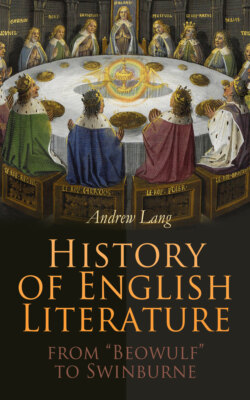Читать книгу History of English Literature from "Beowulf" to Swinburne - Andrew Lang, Robert Kirk - Страница 74
На сайте Литреса книга снята с продажи.
CHAPTER XIV.
EARLY SCOTTISH LITERATURE.
ОглавлениеTable of Contents
For purposes of convenience the development of "Ynglis" literature north of the Tweed and Esk, may be treated in this place.
Originally the "Scots" or Scottish tongue was Gaelic, the language of the Irish Scots who, landing in Argyll about a.d. 500, finally gave a dynasty and its existing name, to "Scot" land. When the dynasty acquired the Anglicized Lothian and much of Cumberland, it adopted the English speech, consequently the writers of the thirteenth and fourteenth centuries in Scotland used a form of northern English or "Ynglis," and knew not Gaelic. They called their speech "English" till the long wars with England led them to draw a distinction and patriotically style it "Scots" or "Scottis". Thus by 1562, Ninian Winzett upbraids John Knox for "knapping English" in his writings, and forgetting the "Scots" that he learned at his mother's knee. Gaelic was no longer reckoned "Scots," it was Ersch, Yrisch, or Erse. Even before the days of Edward I, the town seal of Stirling, on the Forth, describes the Gaelic-speaking men north of Forth as Scoti bruti. The Scottish writers did not know, and therefore despised Gaelic, from which they have scarcely borrowed anything. Latin and French they knew, and enriched their tongue by borrowing from these sources.
The one verse of Scottish poetry that may have survived from the end of the thirteenth century, the lines on the death of Alexander III, are charming, but, if they were written at the time, or shortly after, they must have been modernized, more or less, when Wyntoun, the rhyming chronicler, quoted them about 1420, twenty years after the death of Chaucer.
